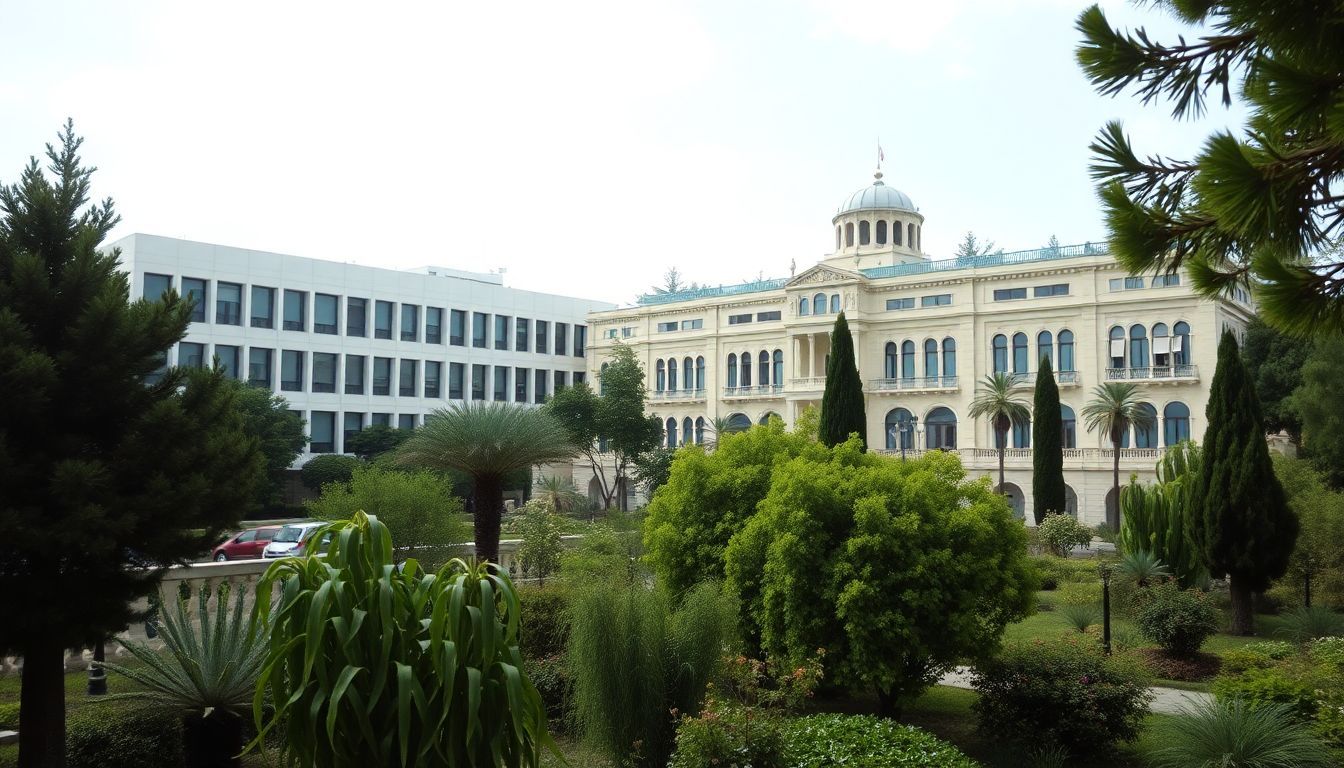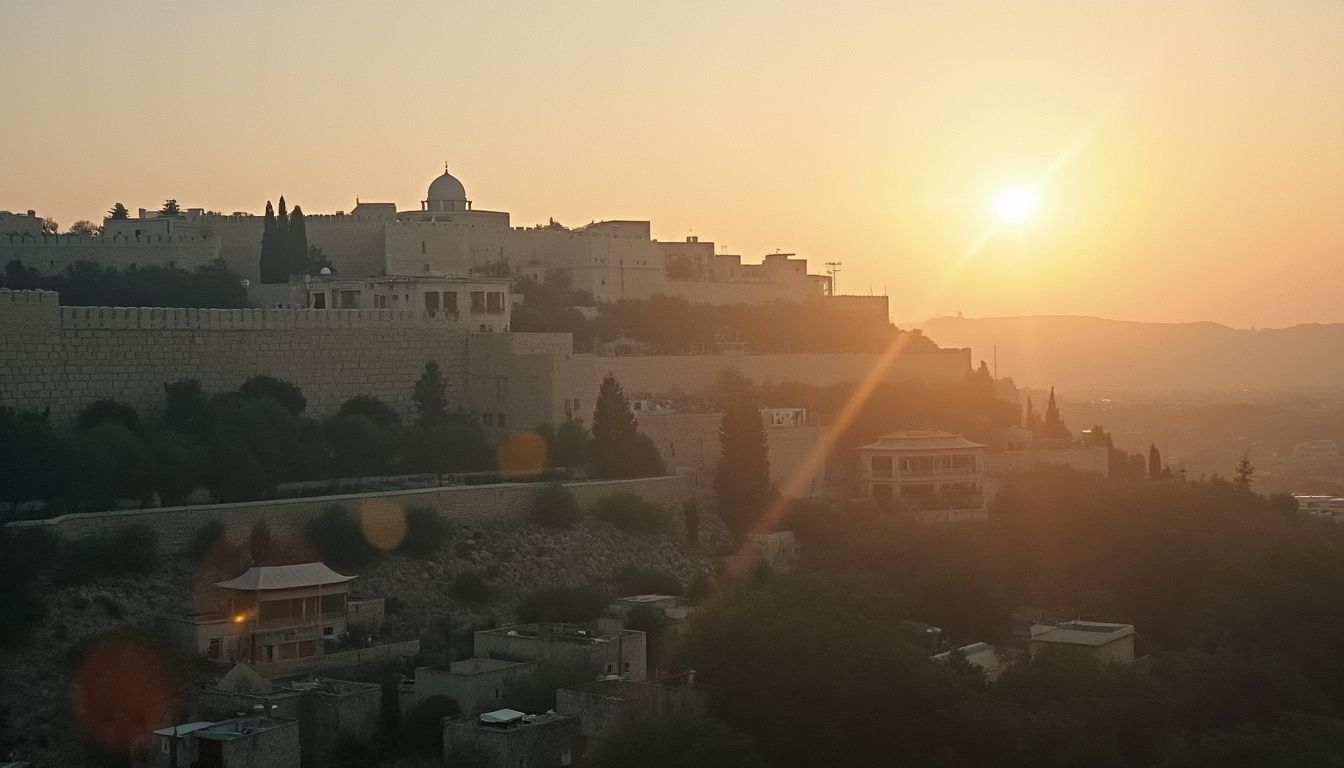Finding the perfect spot to see Jerusalem can be tough. Mount Scopus stands tall at 826 meters, offering a unique view. This blog will guide you through its attractions and history, making your visit unforgettable.
Get ready for an adventure!
Key Attractions at Mount Scopus

The Hebrew University (Mt. Scopus Campus) offers a blend of modern academia and historical significance, while the National Botanical Gardens provide a serene escape in the heart of Jerusalem. Moreover, Augusta Victoria Hospital and Church of the Ascension stand as prominent landmarks with compelling stories to uncover.
Hebrew University (Mt. Scopus Campus)Hebrew University resides prominently on Mount Scopus and has been a symbol of education since its inauguration in 1925. This campus was established in line with a Zionist vision to foster education and culture, serving as a key point for Israel’s scholarly network.
Positioned at a height that provides unparalleled views of Jerusalem, the university has expanded into a notable landmark. Presently, it dominates Mount Scopus and functions as a center for learners and researchers worldwide.
National Botanical GardensMount Scopus hosts Hebrew University, an institution that represents the blend of ancient history and contemporary academia.
The National Botanical Gardens in Jerusalem provide visitors a serene retreat from the city’s hustle. These gardens demonstrate a broad range of plants native to Israel, establishing an active research and conservation zone.
Individuals visit this place to relish peaceful strolls amid the distinct flora that flourish in this region’s weather.
Guests can traverse areas devoted to distinct ecosystems discovered within Israel, such as arid landscapes and Mediterranean woodlands. This enables a learning trip through the nation’s diverse botanical life from the convenience of Mount Scopus.
The gardens act as a peaceful spot for unwinding and simultaneously hold a critical position in researching plant types and their habitats.
Augusta Victoria Hospital / Church of the Ascension
Mount Scopus is home to the Augusta Victoria Hospital and the Church of the Ascension, enriching its historical allure. The hospital, established in the early 20th century, contributes vital healthcare not just for local residents, but also for individuals from adjacent regions.
Adjacent to it stands the Church of the Ascension, recognized by its prominent tower that presents sightseers with a singular viewpoint over Jerusalem. This location underscores Jerusalem’s extended history as a junction for diverse cultures and religions.
Inspecting these significant sites gives travelers enhanced insight into the blending of contemporary requirements with ancient history on Mount Scopus. The subsequent topic is other highlights that add to the memory of this location.
Unique Features of Mount Scopus
Mount Scopus provides breathtaking panoramic views of Jerusalem and the Dead Sea, offering visitors a stunning vantage point to appreciate the historical significance and landmarks.
As a site of great historical importance, Mount Scopus boasts unparalleled vistas that display the constantly changing cityscape and its cultural heritage.
Panoramic Views of Jerusalem and the Dead Sea
Mount Scopus boasts a stunning panoramic view of the Old City and the Kidron Valley. From this vantage point, visitors can witness the captivating beauty of Jerusalem, one of the oldest cities in the world.
In addition, Mount Scopus offers a unique opportunity to behold not just Jerusalem but also an unparalleled view of the Dead Sea.
This mountain stands at an impressive 826 meters above sea level, providing an ideal location to take in these magnificent vistas. Furthermore, as part of its historical significance, Mount Scopus is one of the few places offering clear sightlines towards both the sacred Dome of The Rock and the remarkable Dead Sea.
With such incredible views and significant historical contexts surrounding it, a visit to Mount Scopus is an experience that showcases both natural beauty and cultural importance.
Historical Significance and Landmarks
Transitioning from the breathtaking panoramic views, let’s delve into Mount Scopus’ historical significance and landmarks. The Hebrew University, founded in 1918 and opened in 1925, is a cornerstone of learning and culture on this mountain.
In addition, between the 1948 Arab–Israeli War and the 1967 Six-Day War, Mount Scopus was a UN-protected area, highlighting its historical importance. The area also boasts Augusta Victoria Hospital and Church of the Ascension as significant landmarks.
This holds cultural and historical importance with related searches for Mount Scopus in the Bible, emphasizing its deep-rooted significance. Furthermore, being part of the Mount of Olives further emphasizes its historic relevance within Jerusalem’s ever-evolving realm.
Besides, it remains an iconic landmark due to its unique position overlooking Jerusalem’s Old City across the Kidron Valley — offering visitors a firsthand experience of history.
Conclusion: Planning Your Visit to Mount Scopus
Plan your visit to Mount Scopus, a significant landmark in Jerusalem’s northeastern region. Discover panoramic views of the Old City and experience historical and cultural significance.
Don’t miss the Hebrew University campus and National Botanical Gardens during your exploration. Get ready to explore this unique destination that offers breathtaking vistas and enriching experiences for all visitors.

